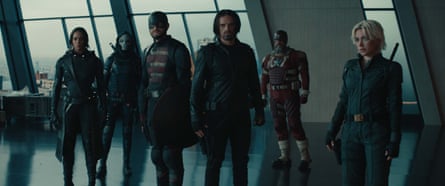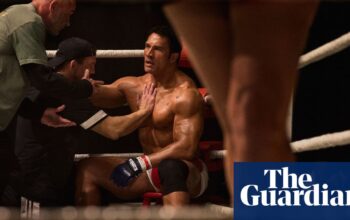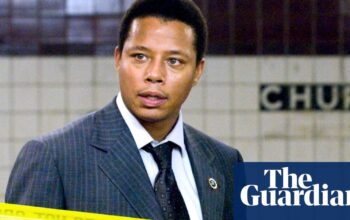Thunderbolts* can be messy. Not just the movie, with its clumsily forced narrative beats and whiplash tonal shifts. But also, its title characters, the broken and lonely souls who ditch the colourful costumes and wear their emotions on their sleeves, as if it’s their brand.
These reluctant heroes, led by Florence Pugh’s Yelena Belova, the troubled sister to Scarlett Johansson’s late Black Widow, are defined by how much they need therapy. They wrestle with themselves more than the bad guys, in a way that’s more pronounced than the most unstable among Marvel’s stable of wisecracking world saviors. They’re endearingly vulnerable, at times devastatingly so, and yet still fun and exciting enough to save Marvel.
The globe-dominating franchise, biding its time until the next wave of Avengers movies, has been in desperate need of saving, what with recent misfires like The Marvels and Captain America: Brave New World. And Thunderbolts, which happens to be the best thing to come from the brand since WandaVision (still the high watermark), gets the job done.
You would be forgiven if you’re wondering who the hell the Thunderbolts* even are. The title stylized with an asterisk playfully winks at the general air of uncertainty around them. In the comic books, Thunderbolts started out as a series where, in the Avengers absence, villains disguise themselves as heroes. Here they’re a Suicide Squad-like team up consisting of villains and antiheroes, repurposed supporting figures from some of Marvel’s more forgettable movies and TV shows.
David Harbour returns as Yelena’s dad Alexei Shostakov aka Red Guardian, who has been slumming it as a limo driver ever since the events in Black Widow, while readily on-call for hero duty. Wyatt Russell’s John Walker, the disgraced Captain American replacement, who was fired after he murdered an unarmed insurgent in The Falcon and The Winter Soldier, also checks in for duty. There’s also Ant-Man and The Wasp’s villain Ghost (Hannah John-Kamen) and, the most popular among them, Bucky Barnes (Sebastian Stan), the former Winter Soldier. He’s all too familiar with the redemption journey the Thunderbolts, all haunted by sins from their past, are embarking on. But this time, the redemption is two-fold. It belongs to Marvel too.
I would be remiss not to point out that this franchise has a pretty good track record with B-teams like this. The whole MCU (Marvel Cinematic Universe) got off the ground with leftovers like Iron Man, Captain America and Thor, after all – when more popular heroes like Spider-Man and the X-Men had been loaned out to other studios. And when these would-be Avengers became the dominant force in entertainment, the Guardians of the Galaxy, complete with a machine gun toting raccoon and a tree voiced by Vin Diesel, came out of left field to grow into fan favourites. It’s as if, when Marvel is unburdened by familiarity and the entitled demands of fans, they can approach something, dare I say, original.
OK, maybe original is too much, then and now. Thunderbolts is more like a fresh spin on the familiar Avengers formula, one that, as Pugh inferred in an interview with Empire Magazine, borrows some trendy touches from indie A24 movies. The latter studio is behind Midsommar, the gruesome thriller where Pugh came on hard with the trauma, and Oscar-winner Everything Everywhere All At Once, which casts a large shadow over the plot and climactic action in Thunderbolts.
The action, so often imbued with and even led by personality, immediately feels different from its opening frames, which actually boasts captivating aesthetics – a rarity in the Marvel universe. “There is something wrong with me,” are the first words we hear from Pugh’s Yelena, as she teeters over the edge of Merdeka 18, one of the world’s the tallest building. She takes a deep and meaningful breath, as if she’s comfortably embracing death (and this won’t be the first time she does that), before leaping off the ledge.

She’s not taking her own life, but throwing herself into combat, engaged in impressive acrobatic choreography that’s often shot from a distance or even overhead, as if disembodied, giving us the space to observe its thrills while also reflecting where she’s at emotionally. She’s talking about her feelings while throwing roundhouses. Her dry internal monologue riddled with flip gallows humour that fits the mood, as if she’s detached from those emotions she identifies in comical though not necessarily healthy ways.
Her mission is to destroy evidence, covering the tracks for Julia Louis-Dreyfus’s scheming CIA director Valentina Allegra de Fontaine, who Congress has in the hot seat for her questionable tactics. On another such mission, Yelena, along with fellow covert operators Ghost and John Walker, are themselves the targets. They’re sent to take each other out. After a nifty little brawl, they decide, despite their antisocial behaviour, to work together instead.
They also happen upon Bob, who Lewis Pullman plays as an undefined mass of anxieties and yearning. He’s a top-secret human guinea pig, genetically engineered with cataclysmic superhuman abilities, which, as you would expect, goes bad. Here, Thunderbolts borrows a little from Josh Trank’s Chronicle, which was also about giving superpowers to someone in crisis.
The eventual showdown between the Thunderbolts and Bob’s supervillain side the Void, who consumes humans in dark shadows, is ambitious if also ungainly, taking place largely in surreal internal spaces that Yelena amusingly dubs “interconnected shame rooms”. The characters battle their emotions, fighting for healing, as the movie tries Everything Everywhere-style to wrestle some theatricality out of all this. That climax makes for an admirable attempt at doing right by the movie’s mental health themes, which Thunderbolts, more often than not, doesn’t earn.
It’s already hard to take this stuff seriously in a franchise trying to earn some goodwill as it nudges our attention towards upcoming Avengers movies. Thunderbolts often irritates because the depression and trauma the movie supposedly grapples with so often lives on the surface, like easy characters traits that are spoken out loud or worn like another costume fitting.
But if it ultimately works, it’s all due to Pugh, who can wrestle sincerity out of a screenplay (and a franchise) that has so little, capturing a whole emotional arc in just her moments of silence. She’s a superhero performer, easily navigating the tricky balance between cheeky Marvel-brand humour and genuine pathos.
Thunderbolts can be messy, sure. Pugh is the kind of star who can thrive in such mess.
-
Thunderbolts is out in US and UK cinemas on 2 May
Source: theguardian.com


